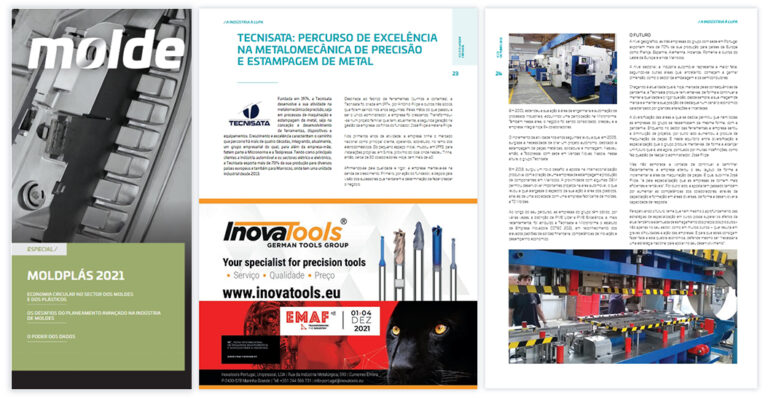- TECNISATA IN MOLDE ONLINE MAGAZINE -
- TECNISATA IN MOLDE ONLINE MAGAZINE -
-
TECNISATA PATH OF EXCELLENCE IN METALWORKING AND METAL STAMPING
-
"
- Founded in 1974, Tecnisata develops its activity in precision metalworking, whether in metal machining and stamping processes, or in the design and development of tools, devices and equipment. Growth and excellence characterize the path it has been following for more than four decades, currently integrating a business group which, in addition to the parent company, includes Micronorma and Toolpresse. With the automotive industry and the electrical and electronics sectors as its main customers, Tecnisata exports more than 70% of its production to several European countries and also to Morocco, where it has had an industrial unit since 2013.
Destined for the manufacture of tools (embossing and cutting), Tecnisata was created in 1974 by António Filipe and three other partners who left in the following years. Through the hands of what became the sole administrator, the company grew. It became a family project that currently has the second generation running the company: the founder’s sons, José Filipe and Helena Filipe. - In the first years of activity, the company had the national market as its main customer, operating, above all, in the field of household appliances. From the initial small space, he moved, in 1993, to his own premises, in Sintra, close to where he was born. It had, then, about 30 collaborators. Today, there are more than 60.
- Asserting itself for its quality and rigor, the company remained on the path of growth. First, by the founder’s action, and then by the vision of the successors who inherited the determination to grow the business.
- In 2001, it extended its action to the area of engineering and automation of industrial processes, acquiring a stake in Micronorma. Also in this area, the business was consolidated, grew and the company now has 34 employees.
- The increase in activity in the following years led, in 2005, to the need to create an autonomous project, dedicated to stamping metal parts, welding and assembly. Then, Toolpresse was born, headquartered in Vendas Novas. At that time, the Tecnisata group was born.
- In 2013, a new challenge arose: the focus on productive internationalization, with the creation of a stamping and component production company in Morocco. Its proximity to some OEMs has allowed it to develop important projects in the automotive area, which has led it to broaden its scope of action to the plastics area, through a partnership with a mold manufacturing company, TJ Moldes.
- Throughout its history, the group companies have been awarded, on several occasions, the distinction of SME Leader and SME Excellence; and, more recently, Tecnisata e Micronorma was awarded the status of Innovative Company COTEC 2021, in recognition of the high standards of financial strength, innovation skills and economic performance.
- THE FUTURE
- Geographically, the three group companies headquartered in Portugal export more than 70% of their production to European countries such as France, Spain, Germany, Netherlands, Romania and others in Eastern Europe and Morocco.
- At the sectorial level, the automotive industry represents the largest share, followed by other areas that, meanwhile, are beginning to gain dimension, such as the packaging sector and semiconductors.
- Coming to the present time, which is today marked by the consequences of the pandemic, Tecnisata seeks to reinvent itself, in order to continue to maintain the quality and rigor that have always been its brand image and to maintain its position as a stand out in an economic scenario characterized by major changes and uncertainties.
- The diversification of the areas to which it is dedicated has meant that not all the companies in the group are equally resentful of the pandemic. While in the tools sector, the company felt the reduction of projects, on the other hand, the demand for machining parts increased. It is in this balance between diversification and specialization that the group seeks to maintain itself, in order to reach a future that has been, until now, punctuated by many uncertainties, as the director, José Filipe, points out.
- But the desire to continue does not weaken. Recently, the company changed its layout in order to increase the area of machining parts. It is because, underlines José Filipe, “it is through specialization that companies become more efficient and profitable”. On the other hand, the focus has also been on increasing the skills of employees, through training and training in different areas, in order to develop the capacity to respond.
- Looking to the future, he fears that not even the deepening of the specialization strategies can overcome the effects of the current sharp trend of crushing product prices – not only in his sector, but in many others – which results in serious difficulties for the action of the companies. And for them to be able to face this economic downturn, he even defends that “a national strategy is needed to support their development”.
-
"
-
- 11/01/2022
